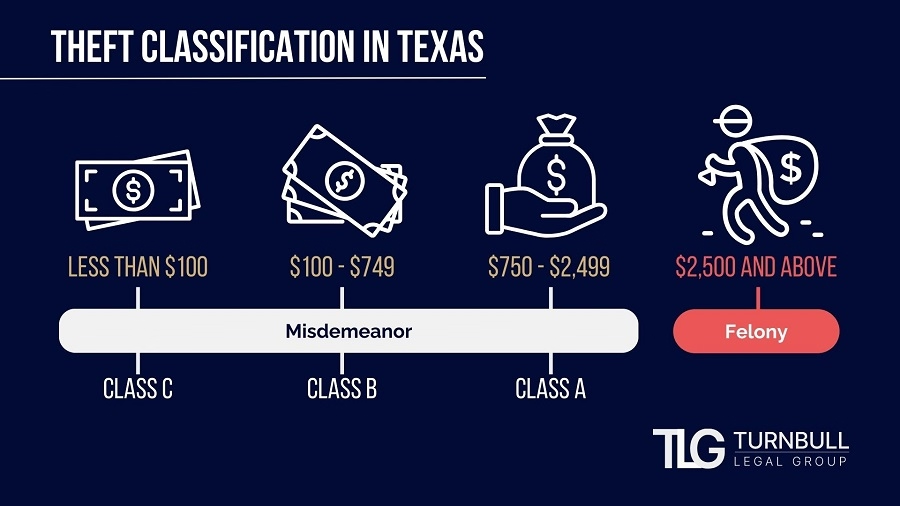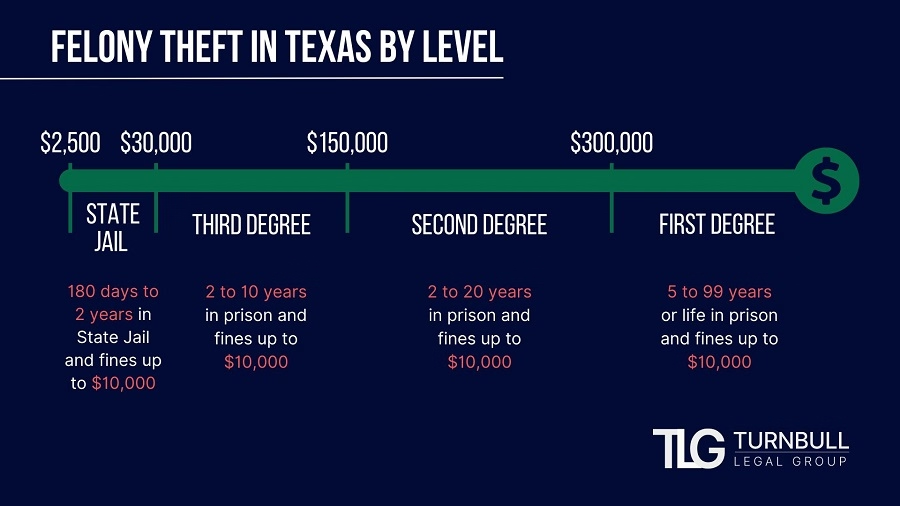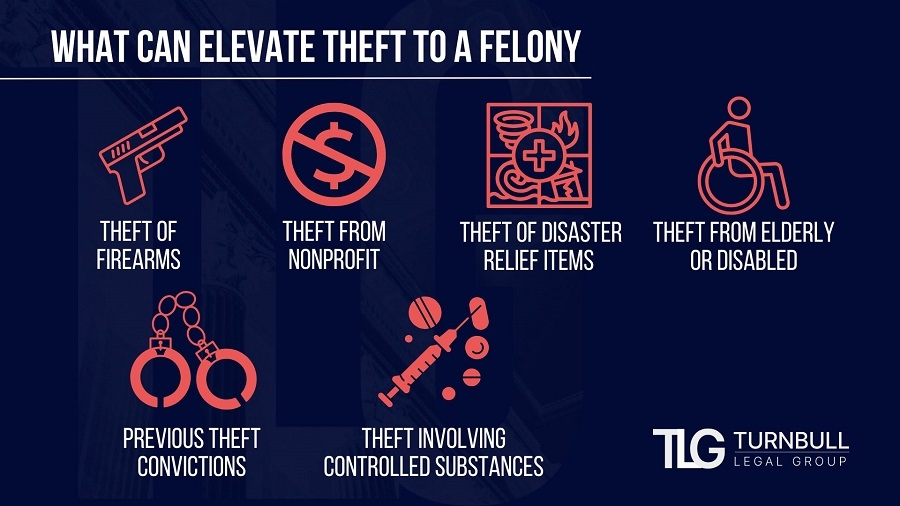Theft charges in Texas can range from minor misdemeanors to serious felonies. When does a theft cross the line into felony territory? The answer depends not only on the value of the stolen property but also on other factors, such as what type of property was stolen.
You can better understand your rights when you know when a property crime becomes a felony in Texas. If you’re facing theft charges, Turnbull Legal Group is here to help.
What Is Theft Under Texas Law?
Texas law defines “theft” as when a person unlawfully appropriates property with the intent to deprive the owner of it. Theft charges can include anything from shoplifting to large-scale organized crime involving significant amounts of money or property.
When Is Theft a Misdemeanor vs. a Felony?

Theft offenses may be misdemeanors or felonies. This classification is primarily based on the value of the stolen property. While a misdemeanor theft conviction is life-altering, felony thefts carry even more severe consequences.
How much theft is a felony in Texas? According to Texas Penal Code Chapter 31, theft becomes a felony when the stolen property is valued at $2,500 or more.
Thefts under that amount can be charged as misdemeanors. However, not all misdemeanor charges are the same.
Here's a breakdown:
- Less than $100
Class C misdemeanor - $100 to Under $750
Class B misdemeanor - $750 to Under $2,500
Class A misdemeanor - $2,500 and Above
Felony theft
In some cases, felony theft charges can apply even if the stolen property is valued at under $2,500. This can happen when the defendant has previously been convicted of theft, for example.
Felony Theft Levels in Texas

When theft qualifies as a felony, the penalties vary depending on the stolen property's value and other factors.
State jail felony theft:
- Theft of property valued from $2,500 to under $30,000.
- Punishable by 180 days to 2 years in a state jail facility and fines of up to $10,000.
- May also be applied to the theft of firearms, vehicles, livestock, or official ballots.
Third-degree felony theft:
- Theft of property valued from $30,000 to under $150,000.
- Punishable by 2 to 10 years in prison and fines of up to $10,000.
- May also be applied to the theft of controlled substances from a healthcare facility.
Second-degree felony theft:
- Theft of property valued from $150,000 to under $300,000.
- Punishable by 2 to 20 years in prison and fines of up to $10,000.
First-degree felony theft:
- Theft of property valued at $300,000 or more.
- Punishable by 5 years to life in prison and fines of up to $10,000.
Factors That Can Elevate Theft to a Felony

Sometimes, the theft of lower-valued items may still be charged as a felony due to certain aggravating factors.
These are some examples:
- Theft of firearms
- Theft from a nonprofit organization
- Theft of items intended for disaster relief
- Theft from an elderly or disabled person
- Previous theft convictions
Theft involving controlled substances — especially from a pharmacy or hospital — can elevate the crime to a third-degree felony or even higher, depending on the circumstances. Such cases are taken very seriously by Texas courts.
Penalties for Felony Theft in Texas
Theft is a serious crime in Texas, and penalties for felony theft include more than just fines or imprisonment.
A conviction can result in:
- Jail or prison sentences ranging from several months to life imprisonment.
- Fines of up to $10,000.
- Civil penalties, especially in retail theft cases.
- Restitution, meaning the defendant must repay the value of the stolen property.
- Loss of certain rights, including the right to own firearms or the right to vote.
It is difficult to seal a criminal record after a conviction, which means these consequences could last long after the sentence is served.
State Jail vs. Prison
The state jail felony classification in Texas is unique. Instead of going to a traditional prison, someone convicted of this type of felony will serve their time in a state jail facility. The sentence can range from 180 days to two years.
Defending Against Felony Theft Charges
If you're facing felony theft charges, the most important thing you can do is hire a theft and robbery attorney. A skilled criminal defense lawyer can build a strong defense strategy, whether that involves proving the owner's consent or challenging the value of the stolen property.
Several potential defenses may apply in felony theft cases:
- This was a case of mistaken identity.
- The defendant did not intend to permanently deprive the owner of the property.
- The defendant had the owner’s consent to take or use the property.
- The value of the stolen items was lower than the prosecutor claims.
An experienced criminal defense attorney who focuses on theft crimes will know which defense could give you a strong chance for reduced charges or an acquittal.
Contact a Texas Theft Attorney Right Away
In Texas, theft becomes a felony when the value of the stolen property exceeds $2,500. The degree of the felony depends on the amount of the theft. Other factors can also lead to felony theft charges, such as theft of a vehicle or theft from a nonprofit organization. Penalties may include prison time, fines, and long-lasting effects on your personal and professional life.
When you’re up against a potential felony record, you need a strong defense team. Turnbull Legal Group is led by former State District Court Judge and Chief Prosecutor E.R. "Ned" Turnbull. His past experience as a judge has granted him valuable insights into every aspect of the criminal justice process.
If you or a loved one is facing felony theft charges, contact us to schedule a free case review.
Facing Felony Theft Charges? We Can Help!
Turnbull Legal Group is ready to fight for your rights and protect your future. Don't wait — get in touch with us today.




.webp)

